Hey, so you’re out of onion powder and thinking, “Now what?” No biggie.
Dishing out flavors that wow without our buddy onion powder is easier than flipping pancakes.
We’ve dug around to find the top substitutes that keep your cooking game strong. And guess what?
Some of these might just be chilling in your kitchen right now, ready for action.
Each pick we’ve got lined up packs its own unique punch, ensuring your dishes miss nothing in the flavor department.
Ready to amp up your meals with these game-changing alternatives?
Stick with us; this is the kind of kitchen hack list you’ll want to bookmark for sure.
What is Onion Powder?

Onion powder is simply a seasoning and flavor agent made from pounded dried onions.
It’s a popular ingredient and is available in many places.
It’s very flavorful, and you can also use it as a spice in some dishes.
You will find red, white, or yellow onion powder at the stores.
You can also make it at home by following some simple steps and use them in marinades, bread, stews, soups or anything else.
Manufacturers use at least four methods to make the seasoning, including freeze-drying, vacuum-shelf drying, dehydration and flow drying.
The companies also use toasted onions to make some varieties of onion powder.
The 5 Best Substitutes For Onion Powder
Onion powder is a versatile ingredient commonly used in cooking and baking to add a distinct onion flavor to dishes.
However, if you don’t have onion powder on hand or are looking for alternative options, there are several substitutes available.
| Substitute | Key Characteristics | Proper Ratio |
|---|---|---|
| Onion Flakes | Dehydrated onion flakes with a similar flavor | Use 1 tablespoon of onion flakes per 1 teaspoon of onion powder |
| Jarred Minced Onion | Pre-chopped onions stored in jars | Use an equal amount of jarred minced onion as a substitute for onion powder |
| Fresh Onion | Freshly chopped onion with a strong flavor | Use 3 tablespoons of minced fresh onion per 1 teaspoon of onion powder |
| Onion Salt | A combination of onion powder and salt | Use half the amount of onion salt compared to the required onion powder |
| Garlic Powder | Powdered form of garlic with a pungent flavor | Use an equal amount of garlic powder as a substitute for onion powder |
Now let’s dive into each substitute in more detail:
1 – Onion Flakes
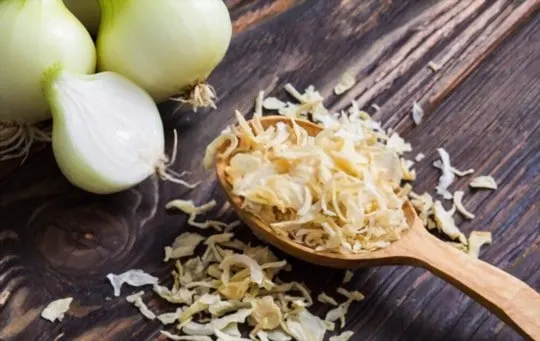
Onion flakes follow the same manufacturing process as onion powder.
It’s just dehydrated onion that’s not been pounded into powder.
You can use the flakes as they are or grind them in an appliance or with mortar and pestle.
You can use onion flakes in almost all the dishes that require the powder version.
Add as a whole or ground in dipping sauces, spreads, sandwiches and salads.
You can also sprinkle them on pizzas, soups and stews.
If you don’t like to use fresh variety, the flakes will work well in marinades if you want some onion flavor.
Onions contain vitamins B and C, calcium, manganese, iron, potassium and antioxidants.
So, using onion flakes regularly in your food can keep specific ailments at bay and boost overall well-being.
- Key Characteristics: Onion flakes are dehydrated onion pieces that offer a similar flavor to onion powder. They provide texture and a mild onion taste to dishes. To substitute onion powder, use 1 tablespoon of onion flakes per 1 teaspoon of onion powder, adjusting the quantity according to your preference.
2 – Jarred Minced Onion
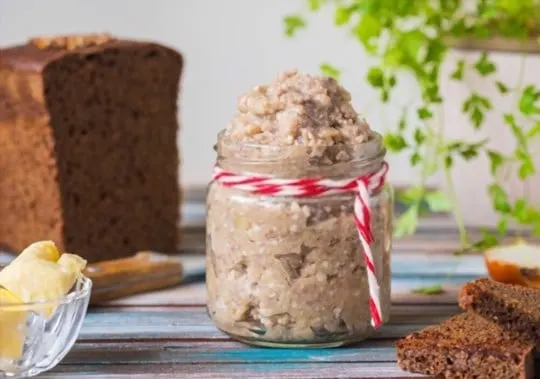
The manufacturing process is the same for onion flakes and jarred minced onion.
Its texture is more refined than the flakes variety but coarser than onion powder.
It can also be a suitable alternative when you don’t have your favorite seasoning.
Jarred minced onion can work great in any dish that asks for onion powder.
So, you can add it to soups, marinades, dry rubs, sauces and sprinkle on sandwiches and pizzas.
It’s also an excellent addition to the famous French onion dip.
You can find many varieties made by different brands, so there is an unlimited choice.
Keep some in the kitchen cupboard to use whenever needed.
- Key Characteristics: Jarred minced onion refers to pre-chopped onions that are packed in jars. They offer convenience and can be a suitable substitute for onion powder. Use an equal amount of jarred minced onion as a substitute for onion powder in your recipes.
3 – Fresh Onion
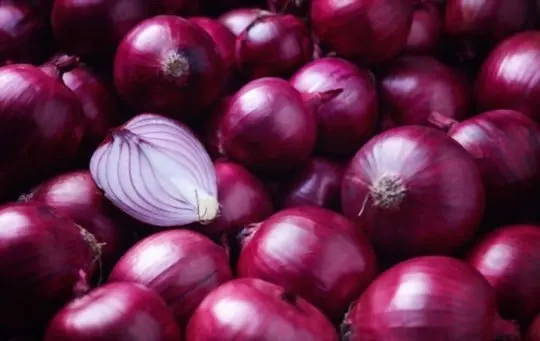
If you are out of onion powder, fresh onion can also be an alternative in several dishes.
But the powder version has a more intense flavor when measured in the same amount.
So, you will have to add more whenever you use fresh onion.
You have the liberty to use any type of onion when substituting onion powder.
You can also cut it in various ways according to a recipe’s demands.
The crunch from fresh onions also is something of an advantage which the powder form can’t imitate.
Add fresh onions to stir-fries, soups, salads, stews, marinades, fried rice, sandwiches, pizzas and much more.
You can dice them up or slice them thin, or you can make rings too.
Fresh onion is also healthier because it’s natural, devoid of additional ingredients.
It contains loads of fiber, minerals and vitamins.
Quercetin, a substance in onions, can prohibit the activity or development of factors that cause cancer.
- Key Characteristics: Fresh onion provides a strong and pronounced onion flavor to dishes. It offers a different texture compared to onion powder but can be a great substitute. To replace onion powder, use 3 tablespoons of minced fresh onion per 1 teaspoon of onion powder, keeping in mind that fresh onion adds moisture to the dish.
4 – Onion Salt
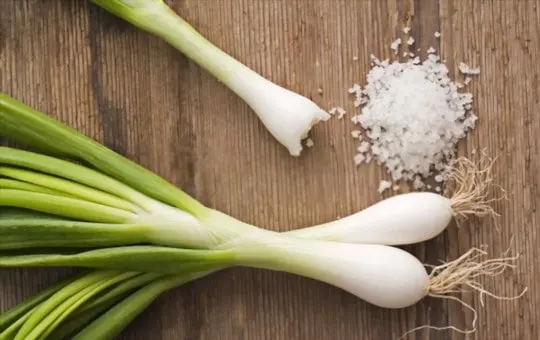
Made from ground onion, salt and some spices, it can also replace onion powder in several dishes.
Except for the saltiness, both are almost the same.
So, when the other seasoning is missing, grab a bottle and use it as required.
Onion salt can be a perfect substitute in tomato and egg dishes, meat dishes, marinades, stir-fries, stews and soups.
You can also sprinkle it on top of salads and snacks.
Use it in any dish where there is a demand for onion powder.
It’s also a very healthy option as it doesn’t have fat, calories or cholesterol.
But you may want to lower the amount of salt and salty items to maintain the flavor.
- Key Characteristics: Onion salt is a combination of onion powder and salt. It offers a salty and onion-like taste to recipes. When using onion salt as a substitute for onion powder, reduce the required amount by half since it contains both onion powder and salt.
5 – Garlic Powder
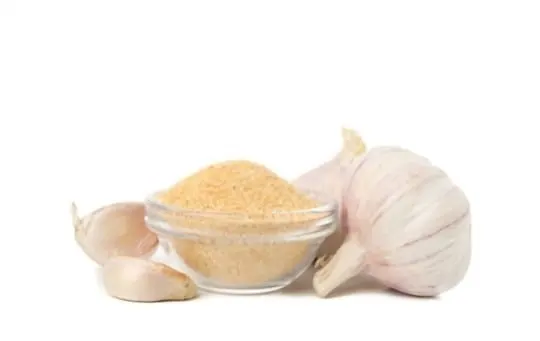
Finally, if you don’t have onion powder, you can opt for garlic powder.
It’s made in a similar way as the former ingredient but may contain some other spices as well.
It has a more pungent and different smell and flavor, but it can suit well in a variety of dishes.
Both are pretty versatile, but you can use garlic powder in even more dishes.
So, you have a great option when you use it.
Add it to garlic bread dough, bruschetta, sauces, and salad dressings; you can also make chutneys and include it in soups, stews, curries and pickles.
Besides being a flavorful spice, garlic also has many medicinal properties, and so does garlic powder.
When we chop, crush or chew garlic, it produces sulphuric compounds, which are responsible for the various health benefits.
- Key Characteristics: Garlic powder is a powdered form of garlic with a pungent and savory flavor. While it doesn’t provide the exact taste of onion powder, it can add depth to dishes. Use an equal amount of garlic powder as a substitute for onion powder, adjusting the quantity based on personal preference.
Conclusion
Since onion powder adds so much taste to food, it can be difficult not to cook without it.
But when it’s unavailable, you can always use one of the items mentioned above.
If you follow the ratio, your dish will taste delicious with a distinct aroma.
Apart from the five ingredients, you can also use shallots, onion paste, granulated onion, celery seed, fennel bulb, chopped celery, leeks, scallions, chopped chives, and garlic salt.
However, use them only if the others are unavailable.
Have fun cooking great dishes and enjoy them with family and friends.
If you love cooking, experiment with different ingredients to know what each dish tastes like with a specific component.
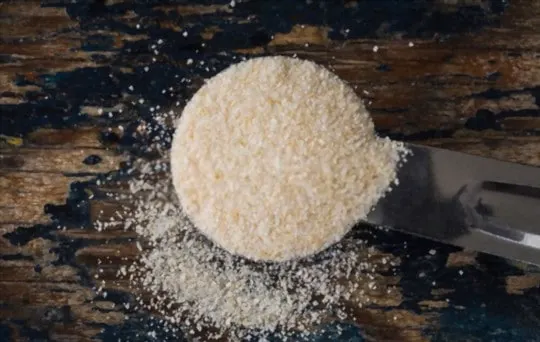
The 5 Best Substitutes for Onion Powder
Ingredients
- Onion Flakes
- Jarred Minced Onion
- Fresh Onion
- Onion Salt
- Garlic Powder
Instructions
- Pick your favorite substitute from the list above.
- Follow cooking directions for your selected substitute with the proper ratio of ingredients.

Andrew Gray is a seasoned food writer and blogger with a wealth of experience in the restaurant and catering industries. With a passion for all things delicious, Andrew has honed his culinary expertise through his work as a personal chef and caterer.
His love for food led him to venture into food writing, where he has contributed to various online publications, sharing his knowledge and insights on the culinary world. As the proud owner of AmericasRestaurant.com, Andrew covers a wide range of topics, including recipes, restaurant reviews, product recommendations, and culinary tips.
Through his website, he aims to inspire and educate fellow food enthusiasts, offering a comprehensive resource for all things food-related.

Leave a comment